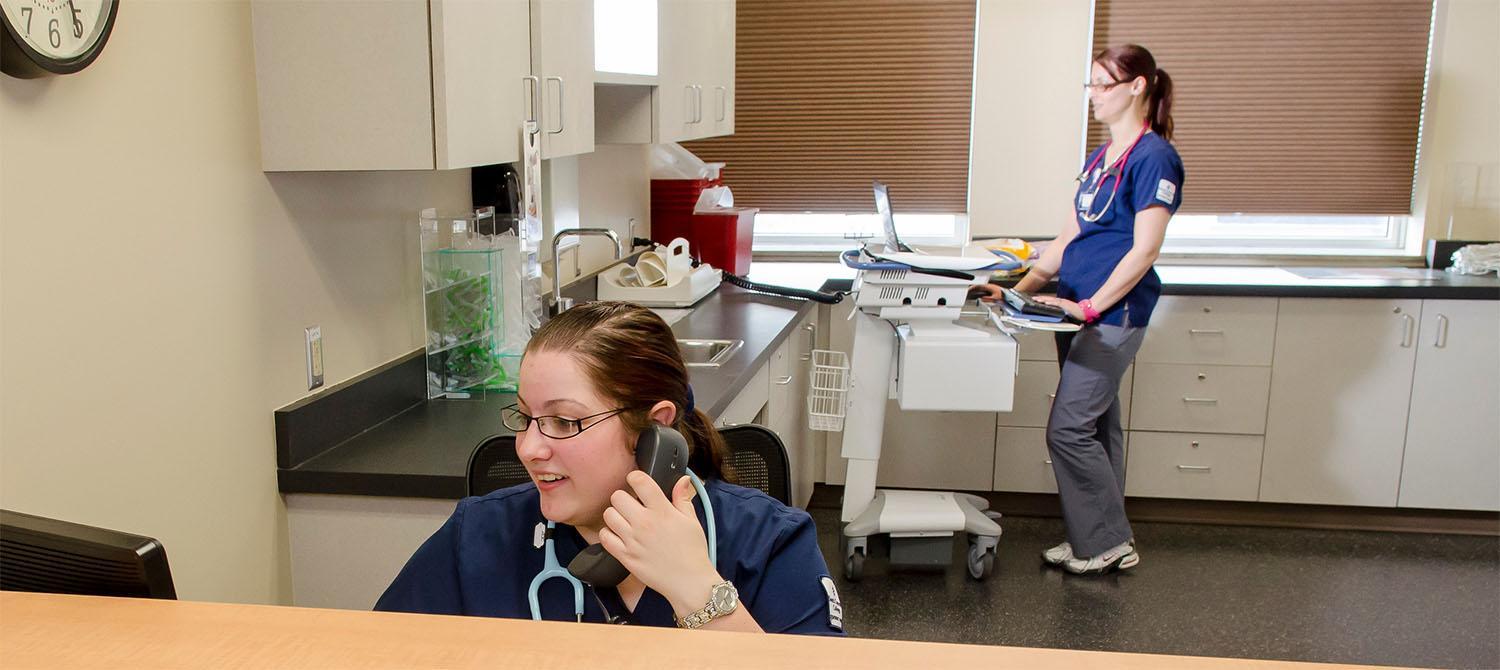

Featured
What Does A Health Unit Coordinator Do
Published: September 3, 2023
Discover what a health unit coordinator does and the essential role they play in healthcare settings. Featured job description and requirements.
Introduction
Are you interested in a career in healthcare that combines administrative tasks with patient care support? If so, becoming a Health Unit Coordinator (HUC) might be the perfect fit for you. A Health Unit Coordinator is a vital member of the healthcare team, responsible for ensuring the smooth operation of a medical unit by coordinating administrative tasks and providing support to both healthcare professionals and patients.
In this article, we will explore the role of a Health Unit Coordinator in detail and provide insights into the responsibilities, skills, and training required for this profession.
Health Unit Coordinators serve as the central point of communication and coordination within a healthcare unit, such as a hospital, clinic, or nursing home. Their primary goal is to ensure efficient and effective functioning of the unit, enabling healthcare providers to deliver high-quality care to patients.
To excel as a Health Unit Coordinator, individuals should possess excellent organizational, communication, and multitasking skills. They must be detail-oriented and able to prioritize tasks in a fast-paced and sometimes high-pressure environment. Additionally, they should have a strong commitment to patient care and a compassionate nature.
The demand for Health Unit Coordinators is growing rapidly due to the increasing complexity of healthcare systems and the need for skilled professionals who can streamline communication and administrative processes. This field offers a promising career path with opportunities for professional growth and advancement.
In the following sections, we will delve deeper into the specific tasks and responsibilities of a Health Unit Coordinator, as well as the importance of effective communication, teamwork, and the necessary education and training needed to pursue this rewarding career.
Job Description
A Health Unit Coordinator plays a pivotal role in healthcare settings, acting as a liaison between healthcare professionals, patients, and other administrative staff. Their main objective is to ensure the efficient operations of a medical unit by managing administrative tasks and providing support to the healthcare team.
One of the primary responsibilities of a Health Unit Coordinator is to maintain accurate and up-to-date patient records. This includes managing patient admissions, transfers, and discharges, as well as recording and updating medical histories, test results, and treatment plans. They may also be responsible for scheduling patient appointments and coordinating transportation arrangements.
In addition to managing patient records, Health Unit Coordinators are responsible for coordinating communication within the healthcare unit. This involves answering phone calls, relaying messages between healthcare professionals and patients, and providing information to visitors and family members. They act as a central point of contact, ensuring that information flows smoothly between all parties involved.
Health Unit Coordinators also perform various administrative tasks to support the healthcare team. This can include ordering and maintaining medical supplies and equipment, managing inventory, and processing paperwork, such as insurance forms and medical billing. They may also assist with scheduling and coordinating meetings, conferences, and trainings for healthcare professionals.
Another crucial aspect of a Health Unit Coordinator’s role is providing patient care support. They assist with patient monitoring, such as taking vital signs and ensuring patient comfort. They may also provide emotional support and help patients navigate through the healthcare system.
Overall, a Health Unit Coordinator acts as the backbone of a healthcare unit, ensuring that administrative processes are streamlined, communication is efficient, and patients receive the care they need. Their ability to multitask, communicate effectively, and prioritize tasks is essential in maintaining a well-functioning healthcare environment.
In the following sections, we will explore in more detail the specific tasks and responsibilities involved in being a Health Unit Coordinator, as well as the importance of effective communication skills and the necessary education and training to succeed in this role.
Responsibilities
As a Health Unit Coordinator, you will have a wide range of responsibilities that are vital to the smooth operation of a healthcare unit. These responsibilities encompass administrative tasks, patient care support, and effective communication. Let’s take a closer look at each of these areas:
1. Administrative Tasks:
- Managing patient records, including admissions, transfers, and discharges
- Updating medical histories, test results, and treatment plans
- Scheduling patient appointments and coordinating transportation
- Ordering and maintaining medical supplies and equipment
- Processing insurance forms and medical billing
- Assisting with scheduling and coordinating meetings, conferences, and trainings
2. Patient Care Support:
- Assisting with patient monitoring, such as taking vital signs
- Ensuring patient comfort and addressing their needs
- Providing emotional support and guidance to patients and their families
- Assisting healthcare professionals during examinations and procedures
3. Effective Communication:
- Answering phone calls and relaying messages
- Providing information to patients, visitors, and family members
- Coordinating communication between healthcare professionals
- Acting as a central point of contact for all parties involved
These responsibilities require excellent organizational skills, attention to detail, and the ability to multitask effectively. As a Health Unit Coordinator, you will need to prioritize tasks, manage time efficiently, and adapt to changing circumstances to ensure the smooth flow of operations.
Furthermore, you will be an integral part of the healthcare team, collaborating closely with doctors, nurses, and other healthcare professionals. Your ability to work well in a team environment, communicate effectively, and maintain professionalism is essential to effectively fulfilling your responsibilities.
In the following sections, we will discuss the importance of effective communication in more detail, as well as the necessary education and training to excel as a Health Unit Coordinator.
Communication
Effective communication is a crucial aspect of a Health Unit Coordinator’s role. As a liaison between healthcare professionals, patients, and administrative staff, your ability to communicate clearly and efficiently is essential for ensuring the smooth and coordinated operation of a healthcare unit.
One of the key communication skills for a Health Unit Coordinator is active listening. Actively listening to the needs, concerns, and questions of patients and healthcare professionals is vital for understanding and addressing their needs accurately. By listening attentively, you can ensure that important information is properly communicated and acted upon, facilitating seamless patient care.
In addition to active listening, effective verbal communication skills are essential. Clear and concise verbal communication not only ensures that information is accurately relayed but also contributes to building rapport and trust with patients and healthcare professionals. As a Health Unit Coordinator, you will need to deliver information in a calm and empathetic manner, especially during times of heightened stress or emergencies.
Written communication is equally important for a Health Unit Coordinator. From updating patient records to documenting procedures and communicating with other healthcare professionals, your written communication skills must be precise, ensuring clarity and accuracy. This is especially critical when documenting medical information, as any errors can have serious consequences for patient care.
Furthermore, effective communication goes beyond verbal and written skills. Nonverbal communication, such as body language and facial expressions, can play an important role in conveying empathy, understanding, and professionalism. Your demeanor and behavior can have a significant impact on the experience and perception of patients and healthcare professionals.
Lastly, as a Health Unit Coordinator, you will interact with individuals from diverse backgrounds, including patients, families, and healthcare professionals. Cultural competence and sensitivity in communication are crucial in ensuring effective interactions and providing patient-centered care. Being mindful of different cultural beliefs, languages, and communication styles can help foster trust and enhance the overall patient experience.
In summary, effective communication is a foundational skill for Health Unit Coordinators. By actively listening, utilizing clear verbal and written communication, being mindful of nonverbal cues, and incorporating cultural sensitivity, you can create an environment of trust, collaboration, and patient-centered care.
In the following sections, we will delve into the specific administrative tasks and patient care support involved in the role of a Health Unit Coordinator, as well as the necessary education and training to succeed in this profession.
Administrative Tasks
As a Health Unit Coordinator, you will be responsible for a variety of administrative tasks that are critical to the smooth operation of a healthcare unit. These tasks encompass a wide range of duties and require excellent organizational skills and attention to detail. Let’s take a closer look at the core administrative responsibilities of a Health Unit Coordinator:
Managing Patient Records:
One of the primary administrative tasks of a Health Unit Coordinator is managing patient records. This includes ensuring accurate and up-to-date information, such as admissions, transfers, and discharges. You will be responsible for updating medical histories, test results, and treatment plans, ensuring that healthcare professionals have access to the most current information for patient care.
Scheduling and Coordination:
A Health Unit Coordinator plays a key role in scheduling appointments and coordinating patient care. This involves managing the unit’s schedule, ensuring that patient appointments are properly scheduled, and coordinating transportation logistics if necessary. You will also be responsible for coordinating meetings, conferences, and trainings for healthcare professionals to ensure effective communication and collaboration within the unit.
Ordering and Maintaining Supplies:
Healthcare units require a constant supply of medical equipment, supplies, and medications. As a Health Unit Coordinator, you will be responsible for ordering and maintaining these supplies, ensuring that the unit is adequately stocked and equipped to provide patient care. This includes managing inventory, monitoring expiration dates, and coordinating with suppliers to ensure timely delivery.
Processing Paperwork:
The administrative tasks of a Health Unit Coordinator also involve processing various paperwork. This can include handling insurance forms, medical billing, and other administrative documents. You will need to ensure that these tasks are completed accurately and in a timely manner to facilitate proper patient care and financial processes.
Assisting with Administrative Support:
In addition to the aforementioned tasks, Health Unit Coordinators may also provide administrative support to healthcare professionals. This can involve assisting in scheduling appointments, managing correspondence, and coordinating administrative tasks specific to the healthcare team’s needs. You will act as a central point of contact, ensuring effective communication and coordination within the unit.
Overall, the administrative tasks of a Health Unit Coordinator are essential for the efficient functioning of a healthcare unit. Your organizational skills, attention to detail, and ability to prioritize tasks will ensure that administrative processes are streamlined, allowing healthcare professionals to focus on providing quality care to patients.
In the following sections, we will explore the patient care support aspect of a Health Unit Coordinator’s role, as well as the importance of teamwork and collaboration within the healthcare setting.
Patient Care Support
As a Health Unit Coordinator, you will not only be involved in administrative tasks but also provide crucial support in patient care. Your role in patient care support is essential in ensuring the comfort and well-being of patients. Let’s delve into the specific responsibilities related to patient care support:
Assisting with Patient Monitoring:
A key component of patient care support is assisting with patient monitoring. This includes tasks such as taking vital signs, recording measurements, and reporting any abnormalities to healthcare professionals. By actively participating in patient monitoring, you contribute to the overall assessment and observation of patients, helping to identify potential issues or changes in their health status.
Ensuring Patient Comfort:
Health Unit Coordinators play a vital role in ensuring patient comfort during their stay at a healthcare unit. This involves responding promptly to patient needs, providing necessary amenities, and addressing any concerns or discomfort they may have. Your compassionate nature and ability to empathize with patients will contribute to creating a supportive and caring environment for their well-being.
Providing Emotional Support:
Illness and hospitalization can be emotionally challenging for patients and their families. As a Health Unit Coordinator, you will provide emotional support and reassurance to patients and their loved ones. Your presence and ability to offer empathy can significantly impact their experience and alleviate anxieties during difficult times.
Assisting During Examinations and Procedures:
During examinations and procedures, Health Unit Coordinators often assist healthcare professionals by preparing the necessary materials, ensuring a sterile environment, and attending to patient needs before, during, and after the procedures. Your coordination and attention to detail in these situations can contribute to a smooth and efficient patient care process.
By actively supporting patient care, Health Unit Coordinators contribute to the overall quality and outcomes of healthcare services. Your role in patient care support helps ensure that patients receive the necessary attention, comfort, and compassion during their healthcare journey.
In the following sections, we will discuss the importance of teamwork and collaboration as well as the education and training required to excel as a Health Unit Coordinator.
Teamwork
Teamwork and collaboration are essential aspects of being a Health Unit Coordinator. As a member of a healthcare team, your ability to work effectively with others is vital for providing seamless patient care and ensuring the smooth operation of a healthcare unit. Let’s explore the importance of teamwork in the role of a Health Unit Coordinator:
Collaboration with Healthcare Professionals:
Health Unit Coordinators work closely with healthcare professionals, including doctors, nurses, and other allied healthcare providers. Collaborating effectively with these professionals is crucial for coordinating patient care, exchanging important information, and ensuring smooth transitions throughout a patient’s healthcare journey. By fostering open lines of communication and establishing strong working relationships, Health Unit Coordinators contribute to the overall quality and efficiency of patient care.
Coordination of Administrative Processes:
The administrative tasks performed by a Health Unit Coordinator often require coordination with other administrative staff within the healthcare facility. This can include working with receptionists, medical secretaries, and other support personnel. By collaborating with these colleagues, Health Unit Coordinators can facilitate efficient administrative processes, ensuring that paperwork, scheduling, and other administrative tasks are completed accurately and in a timely manner.
Collaboration with Patients and Families:
Effective collaboration extends beyond the healthcare team and involves working closely with patients and their families. Health Unit Coordinators play a crucial role in ensuring effective communication and understanding between patients, their families, and the healthcare team. By actively listening, addressing concerns, and effectively relaying information, Health Unit Coordinators can enhance the patient experience and promote patient-centered care.
Multidisciplinary Teamwork:
In addition to collaborating with healthcare professionals and patients, Health Unit Coordinators also participate in multidisciplinary teamwork. This involves working with professionals from various disciplines, such as social workers, physical therapists, and pharmacists, to provide comprehensive and integrated care. By understanding and valuing the expertise and contributions of each team member, Health Unit Coordinators help facilitate effective teamwork and improve patient outcomes.
By embracing teamwork and collaboration, Health Unit Coordinators foster a supportive and cohesive healthcare environment. Their ability to work effectively with others ensures the delivery of high-quality, patient-centered care and contributes to the overall success of the healthcare team.
In the following sections, we will discuss the education and training required to become a Health Unit Coordinator, as well as the career outlook in this field.
Education and Training
To become a Health Unit Coordinator, certain education and training are typically required to gain the necessary knowledge and skills for the role. While specific requirements may vary by employer and location, here are the typical educational pathways and training programs for aspiring Health Unit Coordinators:
High School Diploma or Equivalent:
The minimum educational requirement for most Health Unit Coordinator positions is a high school diploma or equivalent. This level of education provides a foundation in general knowledge and skills necessary for administrative and communication tasks.
Vocational or Certificate Program:
Many aspiring Health Unit Coordinators choose to pursue vocational or certificate programs in Health Unit Coordination. These programs, typically offered by vocational schools or community colleges, provide specialized training in areas relevant to the role, such as medical terminology, healthcare ethics, medical office procedures, and communication skills. These programs can vary in length, ranging from a few months to a year.
Associate’s Degree in Health Unit Coordination:
Some individuals may opt to pursue an associate’s degree in Health Unit Coordination or a related field. These programs typically offer a more comprehensive curriculum that includes additional coursework in healthcare management, medical coding, healthcare law and ethics, and specific software applications used in healthcare settings. An associate’s degree can provide a more in-depth understanding of the administrative and patient care aspects of the role.
On-The-Job Training:
In addition to formal education, on-the-job training is typically provided for Health Unit Coordinators. This training is designed to familiarize new employees with the specific policies, procedures, and software applications used within a particular healthcare setting. It may include shadowing experienced Health Unit Coordinators, hands-on practice with administrative tasks and systems, and ongoing mentorship and guidance.
Continuing education and professional development opportunities are also available for Health Unit Coordinators to stay updated on industry trends, new technologies, and evolving best practices. These may include workshops, conferences, online courses, and certifications relevant to the field.
While formal education and training are crucial, certain skills and qualities are also beneficial for success in this role. These include strong organizational skills, attention to detail, excellent communication abilities, multitasking capabilities, and compassion for patient care.
In the upcoming section, we will explore the career outlook for Health Unit Coordinators and the potential for professional growth in this field.
Career Outlook
The career outlook for Health Unit Coordinators is promising, with a growing demand for skilled professionals in healthcare settings. As the healthcare industry continues to expand and evolve, the need for efficient administrative support and coordination becomes increasingly important. Here are some key factors contributing to the positive career outlook for Health Unit Coordinators:
Increasing Complexity of Healthcare Systems:
The healthcare landscape is becoming more complex, with advancements in medical technology, evolving regulations, and the need for coordinated care across various specialties and settings. Health Unit Coordinators play a vital role in ensuring that administrative processes are streamlined, communication is effective, and patient care is well-coordinated amidst this complexity.
Growing Healthcare Industry:
The healthcare industry is projected to continue growing, driven by factors such as an aging population, increasing chronic disease prevalence, and advancements in medical treatments. As healthcare facilities expand and new healthcare settings emerge, the demand for Health Unit Coordinators is expected to rise, creating more job opportunities in this field.
Importance of Efficiency and Cost-effectiveness:
In an era of healthcare cost containment and focus on efficiency, healthcare organizations recognize the importance of having skilled professionals, like Health Unit Coordinators, who can optimize administrative processes and ensure resources are used effectively. Health Unit Coordinators contribute to cost-saving efforts by managing inventory, coordinating appointments, and streamlining communication, among other tasks.
Potential for Professional Growth:
There are several opportunities for professional growth as a Health Unit Coordinator. With experience, you may have the potential to advance to positions with more responsibility, such as a lead Health Unit Coordinator or administrative roles within healthcare organizations. Additionally, pursuing further education, such as a bachelor’s degree or certifications in healthcare administration or management, can broaden your career opportunities in the healthcare field.
Rewarding and Fulfilling Role:
Beyond the career prospects, being a Health Unit Coordinator can be personally rewarding. The opportunity to contribute to the well-being and comfort of patients, support healthcare professionals in delivering quality care, and witness the positive impact of your work can provide a sense of fulfillment and satisfaction in this role.
Overall, the career outlook for Health Unit Coordinators is bright, with increasing demand for their skills and expertise in healthcare settings. With the right education, training, and dedication to professional growth, you can build a successful and fulfilling career as a Health Unit Coordinator.
In the concluding section, we will summarize the key points discussed and emphasize the importance of Health Unit Coordinators in healthcare settings.
Conclusion
In conclusion, Health Unit Coordinators play a vital role in healthcare settings by coordinating administrative tasks and providing support to both healthcare professionals and patients. With their organizational skills, attention to detail, and excellent communication abilities, Health Unit Coordinators ensure the smooth operation of healthcare units and contribute to the overall quality of patient care.
Health Unit Coordinators are responsible for a wide range of tasks, including managing patient records, scheduling appointments, ordering supplies, and providing patient care support. Their ability to multitask, prioritize, and effectively communicate with diverse stakeholders is crucial in maintaining efficient administrative processes and fostering a supportive healthcare environment.
The career outlook for Health Unit Coordinators is promising, with increasing demands in the healthcare industry for individuals who can streamline communication, optimize administrative processes, and ensure cost-effectiveness. Additionally, there are opportunities for professional growth within the field, including advancement to lead coordinator roles or administrative positions within healthcare organizations.
To pursue a career as a Health Unit Coordinator, individuals typically need a high school diploma or equivalent, along with vocational training, certificate programs, or an associate’s degree in Health Unit Coordination. On-the-job training is also provided to familiarize new employees with specific healthcare facility policies, procedures, and software applications.
In this rewarding role, Health Unit Coordinators have the opportunity to make a meaningful impact on the healthcare system and contribute to the well-being of patients. By efficiently managing administrative tasks, providing patient care support, and collaborating with healthcare professionals and other team members, Health Unit Coordinators ensure the delivery of high-quality, patient-centered care.
Overall, the role of a Health Unit Coordinator is essential and indispensable in the healthcare industry. As healthcare systems evolve and the demand for efficient administrative support grows, the role of Health Unit Coordinators will continue to be vital in ensuring the seamless operation of healthcare units and the delivery of excellent care to patients.









